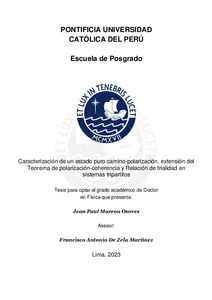Caracterización de un estado puro camino-polarización, extensión del Teorema de polarización-coherencia y Relación de trialidad en sistemas tripartitos
Abstract
Esta tesis expone realizaciones experimentales sobre tres temas desarrolladas en el Grupo
de Óptica Cuántica de la PUCP. Primero, tenemos el trabajo sobre tomografía de un estado puro
bipartito de camino-polarización, donde se produjeron y caracterizaron dichos estados para luz
clásica. Se propuso un método que requiere mediciones estándar de polarización, aun cuando
el estado sea bipartito. Se obtuvieron resultados satisfactorios de tres estados con distintas fases
y amplitudes. Luego, y también para luz clásica, se presenta la extensión para dos qubits
del Teorema de polarización-coherencia (PCT) (Eberly et al., 2017), que involucra la dualidad
onda-partícula. Este teorema, que relaciona visibilidad, distinguibilidad y polarización, se
extendió luego para el caso donde la polarización actúa como marcador (De Zela, 2018), sin embargo,
el qubit de camino no tenía participación en las cantidades a medir. Es así que se expone
una realización experimental que permite también su contribución, evidenciando la generalización
del teorema. Finalmente, con fotones individuales, se proponen dos extensiones a estados
puros tripartitos. Por un lado, la del PCT y, por otro, la Relación de trialidad (Qian et al., 2018),
que involucra visibilidad, distinguibilidad y concurrencia. Para ello, se aprovechó la restricción
entre grado de polarización y concurrencia (Qian et al., 2016), donde esta puede referirse ahora
a sectores del estado tripartito, por lo que se usó una concurrencia generalizada (Rungta et al,
2001). De esa manera, veremos que el entrelazamiento entre subsistemas participará en ambas
relaciones que se buscan generalizar, además de ampliar la visión sobre el concepto de dualidad
onda-partícula. This thesis presents experimental realizations on three topics developed in the Quantum Optics
Group of the PUCP. First, we have the work on tomography of a pure bipartite state of pathpolarization,
where these states for classical light were produced and characterized. A method
was proposed that requires standard polarization measurements, even if the state is bipartite.
Satisfactory results were obtained from three states with different phases and amplitudes. Then,
and also for classical light, the extension for two qubits of the Polarization-Coherence Theorem
(PCT) (Eberly textitet al., 2017) is presented, which involves wave-particle duality. This theorem,
which relates visibility, distinguishability and polarization, was then extended for the case
where polarization acts as a marker (De Zela, 2018), however, the path qubit had no participation
in the quantities to be measured. Thus, an experimental realization is presented that also
allows his contribution, evidencing the generalization of the theorem. Finally, with individual
photons, two extensions to pure tripartite states are proposed. On the one hand, the PCT and,
on the other, the triality relationship (Qian textitet al., 2018), which involves visibility, distinguishability
and concurrence. To do this, we took advantage of the restriction between degree
of polarization and concurrence (Qian textitet al., 2016), where this can now refer to sectors of
the tripartite state, so a generalized concurrence was used (Rungta textitet al, 2001). In this way,
we will see that the entanglement between subsystems will participate in both relations that we
seek to generalize, in addition to broadening the vision on the concept of wave-particle duality.
Temas
Óptica cuántica--Trabajos colectivos
Tomografía óptica
Tomografía óptica
Para optar el título de
Doctor en Física
Collections
The following license files are associated with this item:






